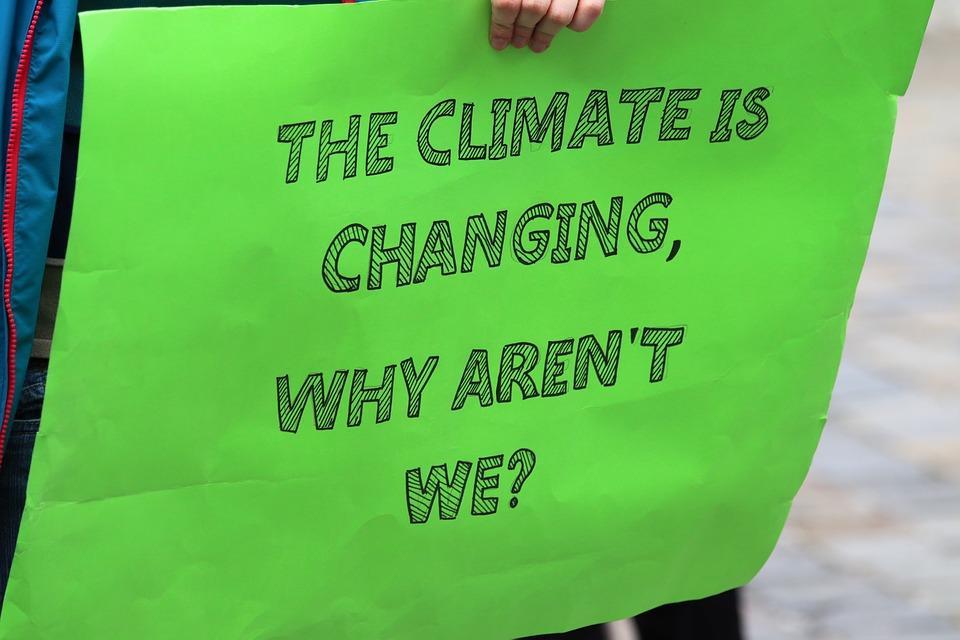This #Take5 post if brought to you from Dr Iain Cross and Dr Alina Congreve, who look at the increasing importance for learning developers of the climate emergency and the practical implications it has for their work. In an exciting development, this blogpost has been paired with ALDinHE’s LD@3 programme – and there will be an LD@3 on the 8th June to continue the conversations started here (joining details coming soon to ALDinHE events!).

Students and sustainability: a symbiosis that benefits their education and society
In this blog, we want to share our ideas and thoughts about teaching climate change with the learning development community, and to stimulate debate around the implications of new guidance from the QAA for learning developers. The blog explores some of the ways in which learning developers contribute to education for sustainable development and how it relates to their wider work. We hope it stimulates discussion, and we are keen to hear your thoughts and ideas ahead of our workshop at the SEDA Conference in December. We have posed a number of questions that we are looking forward to discussing with you at our LD@3 event on 8th June (please check ALDinHE Events soon for joining information and further details).
We have been working together on research projects that explore how to embed climate change into the higher education curriculum. We have recently published a paper on how geography degrees integrate climate change, and alongside that project we have been looking at climate change teaching in a broad range of subjects where it is not usually taught (such as fashion, law, chemistry and literature).
Our research has explored the importance of authentic learning and teaching practices, as the skills and abilities that students need to address the climate challenge are best developed through authentic learning experiences. By ‘authentic’, we mean that they reflect ‘real-world’ tasks and activities that students would be undertaking in a graduate role.
Education for Sustainable Development
There is currently significant national and international interest in climate action. Later this year the UK will host the Glasgow Climate Conference, an international meeting of leaders to take forward co-ordinated action. Delegates from around the world will discuss progress towards preventing severe ecological and humanitarian catastrophes caused by rising global temperatures and extreme weather events. Young people are very concerned about the slow progress towards averting the climate crisis, and the school strikes show that future university students will be expecting their institutions to provide them with the skills and knowledge to address the challenges of climate change, regardless of their chosen discipline

An overwhelming majority of current university students are concerned or very concerned about climate change. A number of UK universities have also declared ‘climate emergencies’ in recognition of the need for substantial action to avoid catastrophic environmental change. With its high priority for university senior managers and for students and prospective students, climate change has significant implications for the work of learning developers.
This renewed and widespread interest in sustainability provided the ideal context for the QAA and Advance HE launch their revised guidance on education for sustainable development (ESD) in late March 2021. The guidance calls for whole-institution approaches to developing the skills, knowledge and competencies in students and staff to address the UN Sustainable Development Goals (UN SDGs). These address the social, environmental and economic aspects of sustainability, and are so wide ranging that many programmes would be addressing them in some way, often without even realising it.
The SGDs can be a useful starting point for discussions with course teams about enhancing learning, teaching and assessment practices. Learning developers can play an important role supporting course teams in embedding ESD, enhancing students’ skills so they can meaningfully contribute to the scientific and societal challenges of climate change.

Authentic learning and assessment
The new QAA ESD guidance highlights the value of authentic learning and assessment to engage students. It includes a set of key competencies that can be mapped into programmes through learning outcomes at programme and module level. They are structured around ways of thinking, ways of practicing and ways of being. Our research has shown that higher-level skills and competencies in geography, for example, can be best developed through authentic climate change teaching, using approaches such as big data analysis, data visualisation, rapid sharing of information, and professional self-reflection.
For learning developers, supporting students as they develop these skills and competencies requires what for many are new approaches. Those working in learning development might not find them all so new – sustainability and climate change are drivers to push curriculum design to catch-up with long-standing learning development values. Traditional essays, which remain common in many degree assessment strategies, are likely to be replaced with more creative and innovative assessments to develop these skills. Academic conventions (e.g. referencing) will be less important than data acquisition, repurposing and innovation. There will be increased emphasis on critical thinking about data sources – the traditional module syllabus of knowledge will emphasise applied skills and outcomes, rather than academic theory and practice.
- Are you seeing this transition in academic programmes in your institution?
- What types of professional development would be helpful for you to be an effective academic developer supporting ESD?

Scaffolding authentic learning
We interviewed colleagues from diverse disciplines including business, humanities and sciences, who all spoke of how a focus on sustainability gradually increased the authenticity of learning activities during undergraduate degrees. This meant that students could practice in first and second year modules the skills they required to succeed in final year ‘live’ projects with external organisations or in workplace settings. The benefits of this are clear: students deploy their knowledge of sustainability in a cause that benefits both their own education and society – a form of service learning – and help universities build positive relationships with their local community.
However, equipping students to do this effectively requires careful scaffolding of the curriculum, so that students are able to acquire the high-level skills and attitudes (e.g. negotiation, resilience, professionalism, adaptability etc.) required for live projects. Our research suggests this is often not done effectively.
Sometimes these skills are technical, for example, poor programme design meant students could not effectively participate in a community GIS module in their third year because they could not undertake a relevant second year module on their pathway.
More often the challenges were around assessment types, with students concerned to produce novel and authentic outputs such as a policy-focused report or a business plan for the first time in their final year. Interviewees spoke of many examples where the curriculum structure did not allow scaffolding to occur, and students struggled to complete these sorts of assessment effectively through lack of ‘skills’. Lack of thought in curriculum design may mean some students are blocked from taking a second year module that would provide them with the opportunities to develop key skills needed in a third year module.
Whilst the problem is often framed in terms of the student, who lacks key skills; from a learning developer perspective, is there a role in working with the academics involved to look at what adjustments they need to make? A key issue was that modules were often designed in isolation, so that programme assessment and teaching strategies were poorly-developed or incoherent.

We advocate for the importance of effective learning development to address and develop more effective scaffolding on degree programmes. Some of these programme shortcomings could be addressed through centrally-run or programme-level study skills sessions for students.
A more effective approach is for learning developers to use their skills and experiences from working with students to identify where scaffolding is lacking in programme design, and feed into ongoing programme review processes to support enhancements. Ideally, learning developers should be embedded in programme and module design processes to design-in scaffolded approaches to benefit all students.
- What can learning developers do to enhance programme level design approaches?
- What tools and approaches have you used to engage programme design teams with scaffolding?
Academic and professional services collaboration
The QAA guidance emphasises that ESD is ‘not only an academic activity’. Our research, and discussions at conferences, have pointed to the importance of partnership and collaborative working for effective climate change teaching.
Some of the best examples of climate change teaching were developed between professional services and academics – for example, developing an energy-saving campaign with the estates team and analysing the data to develop numeracy and reporting skills. The ‘real world’ aspect of authentic learning can be found in the various supporting services found in universities, that are typical of many large organisations (e.g. finance, IT, marketing, human resources and careers, estates). Learning developers can bring together academics and services colleagues to develop these learning experiences.

We think that this opportunity is clearly aligned with ALDinHE’s own manifesto which says learning development ‘infiltrates throughout the university…connecting and collaborating with the wider community’. The academic literature also highlights learning developers are increasingly ‘bridge-builders’ between academics and central policy and strategy. They are therefore in a strategic position to support ESD by creating connections among academics and professional services.
We suggest the key role for learning developers here is to ask the right questions of academics during curriculum development, assessment design and programme review. Are there on-campus sustainability projects that students can engage with, or that can be co-developed between students and professional services? What opportunities are there to develop employability or professional skills in a sustainable development context?
- Do you have any examples or experience of supporting effective collaboration to embed sustainability or climate change into HE teaching?
Final thoughts
We hope that we have provided some interesting points for the learning developer community and academic course teams to reflect on. There is a clear move in UK higher education towards ESD, and the renewed guidance from the QAA and the Glasgow Climate Conference will be focusing attention on what is happening in universities.
In the past learning developers may have been discouraged from discussing climate change with programme teams, feeling they lack technical climate expertise. As this blog shows, it is learning developers deploying their existing skills working with students and course teams that is needed.
We are keen that learning developers are supported to contribute to the discussion and bring their expertise to enhance student learning. We very much welcome your comments and feedback on our thinking so far.
Bios
Dr Iain Cross is currently Associate Dean for Learning and Teaching at St Mary’s University, Twickenham, and a Senior Fellow of the HEA. He has previously been a lecturer in geography. In his current role, he oversees academic professional development and cross-institutional initiatives to enhance the student experience and curriculum development, and teaches on the PgCert in Academic Practice. He has undertaken research into teaching climate change in higher education with Dr Congreve, and recently published articles on BAME student employability and authentic learning. He has a BSc in Environmental Geography from University College London and a PhD in lake ecology from the University of Nottingham. https://www.linkedin.com/in/iaincross/
Dr Alina Congreve: has worked as a lecturer and principal lecturer at several universities including LSE, Reading and Hertfordshire. At Hertfordshire she established and led the MSc in Sustainable Planning. In 2018-19 she worked as a programme manager at Climate KIC, running postgraduate and professional courses developing solutions to climate change challenges. She currently works freelance designing and delivering professional development and short courses for a number of organisations including universities and professional bodies. She holds an MSc in Conservation from UCL and PhD in housing and sustainability from King’s College London.
